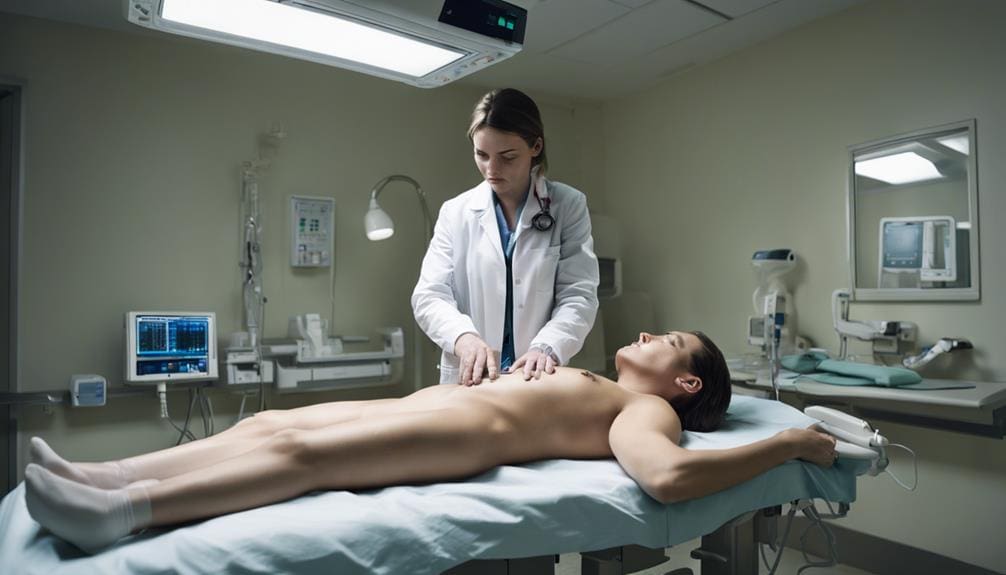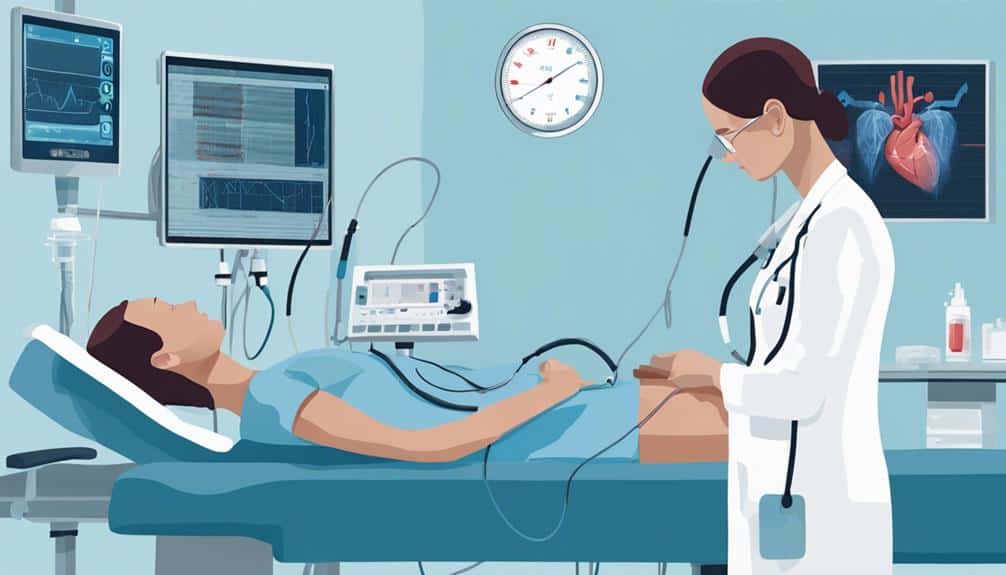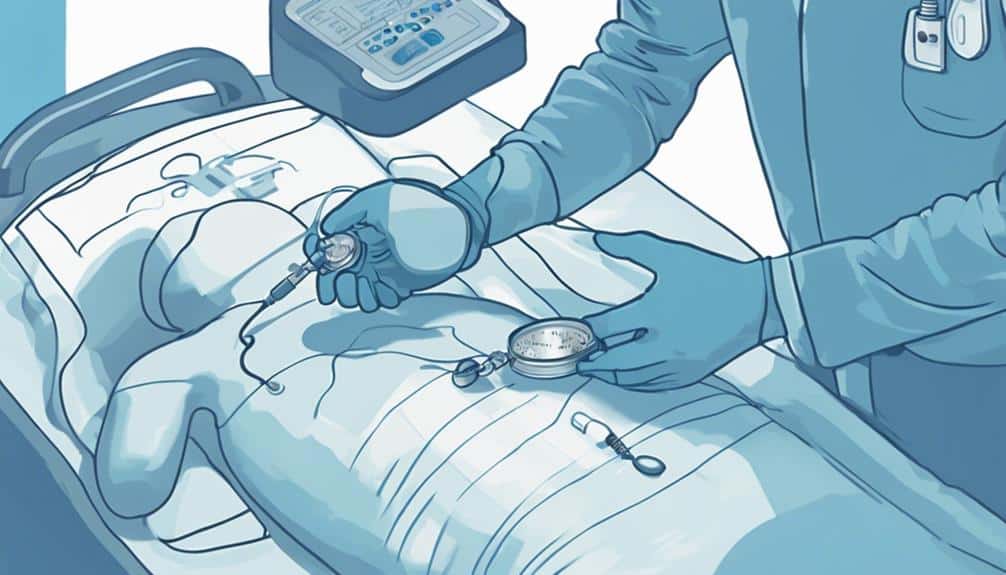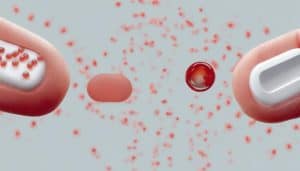You're about to undergo an echocardiogram and wonder how long it'll take. Typically, an echocardiogram takes anywhere from 15 to 60 minutes, depending on the type of test and complexity of the examination. During this time, a trained sonographer or cardiologist will guide you through the procedure, capturing detailed images of your heart's valves, chambers, and vessels using high-frequency ultrasound waves. Once it's done, you'll be able to resume your normal activities immediately. To learn more about what to expect during and after the test, continue on to discover the ins and outs of the echocardiogram process.
Key Takeaways
• The echocardiogram procedure typically takes 15 to 60 minutes to complete, depending on the type of exam.
• The duration of the test varies, but most echocardiograms take around 20 to 60 minutes.
• Different types of echocardiograms have varying durations, but most are generally completed within an hour.
• The actual scanning process usually takes around 15-30 minutes, with additional time for preparation and image analysis.
• The entire process, including preparation and image reconstruction, typically takes less than an hour.
Understanding the Echocardiogram Process
When you undergo an echocardiogram, a trained sonographer or cardiologist will typically guide you through a straightforward process that usually unfolds in a series of steps. During the procedure, you'll be asked to lie on an examination table, and a transducer covered in a special gel will be placed on your chest. This transducer emits high-frequency ultrasound waves, which bounce off your heart, producing images of its structure and blood flow.
As the transducer moves across your chest, it captures detailed images of your heart's valves, chambers, and blood vessels. The ultrasound waves then transmit these images to a computer, which reconstructs them into a detailed picture of your heart's anatomy and function.
The entire process usually takes between 15 to 60 minutes, depending on the complexity of your heart condition and the quality of the images obtained.
Throughout the procedure, you'll be able to breathe normally and won't feel any discomfort from the ultrasound waves.
Once the echocardiogram is complete, the sonographer or cardiologist will analyze the images and provide you with the Results. In most cases, you'll be able to go home immediately after the procedure, with the Results being shared with your doctor or cardiologist for further evaluation and treatment.
Preparing for the Procedure

To ensure excellent imaging quality, you'll need to prepare for your echocardiogram by following some simple guidelines. Before the procedure, you'll need to avoid eating for a few hours and refrain from consuming caffeine for at least 4 hours. Additionally, it's important to avoid applying body lotions on the test day, as they can interfere with the imaging process.
When you arrive for your echocardiogram, you'll be asked to lie on the examination table, usually on your left side. A gel will be applied to your chest to facilitate the ultrasound process. A small probe is passed over your chest, using a type of ultrasound technology to produce detailed images of your heart. In some cases, a contrast agent may be used to enhance image quality.
The echocardiogram procedure will usually take around 20-60 minutes, during which you may experience minimal discomfort due to occasional pressure. After the test, you'll review the results with your physician, and it's important not to stop taking medications without their guidance.
What to Expect During the Test

During the echocardiogram, you'll be asked to assume various positions or hold your breath briefly to make sure the technologist captures high-quality images of your heart. You'll typically lie on your side or back, and the technologist may ask you to roll onto your stomach or sit up during the test. This helps them get clear images of your heart from different angles.
A gel-like substance will be applied to your chest, which helps sound waves produced by the ultrasound probe move smoothly over your skin. These sound waves will bounce off your heart, creating images on a monitor that the technologist will use to assess your heart's function. If your heart walls become thickened or show signs of damage, the technologist will need to capture additional images to monitor certain heart functions.
During the test, you may feel some discomfort due to the pressure applied to your chest, but this is usually minimal. The technologist will guide you through the process, ensuring you're comfortable and relaxed throughout.
As the test progresses, the images will turn into a moving picture, allowing the technologist to analyze your heart's motion and function. After the test, the images will need to be analyzed, and the results will be reviewed with your physician to discuss any findings or further steps.
Echocardiogram Duration and Results

You can expect an echocardiogram to take anywhere from 20 to 60 minutes, depending on the type of test being performed and the specific requirements of the procedure. The duration of the test will vary based on the type of echocardiogram you're undergoing. For instance, a transthoracic echocardiogram (TTE) typically takes around 15 to 60 minutes to complete, and no special preparation is needed. Other types, such as stress echocardiograms or contrast echocardiograms, may also vary in duration based on the specific testing requirements.
In terms of results, you may receive them immediately after the scan, or they may be analyzed later and reviewed during a follow-up appointment with your healthcare provider. It's essential to note that echocardiograms are generally safe and painless procedures, with no radiation involved. However, some types, like transesophageal echocardiograms, may involve slight discomfort or risks that will be explained by the medical team.
After the test, your healthcare provider will analyze the results and discuss them with you during a follow-up appointment. The analysis will provide valuable insights into your heart's structure and function, helping your healthcare provider diagnose and treat any heart-related conditions. Overall, an echocardiogram is a quick, safe, and painless test that provides critical information about your heart health.
Post-Procedure Care and Follow-Up

After undergoing an echocardiogram, your healthcare provider will outline specific post-procedure care instructions tailored to your individual needs. You'll be relieved to know that recovery time is minimal, and you can usually resume normal activities immediately. However, your healthcare provider may advise you to avoid strenuous activities or heavy lifting for a short period.
During this time, you'll likely schedule follow-up appointments to discuss your echocardiogram results and any further actions or treatments needed. Your healthcare provider will review the test results and share them with you, outlining any necessary next steps. Be sure to ask questions or raise concerns during these appointments, as they're essential to your care.
Post-procedure care involves following your healthcare provider's instructions, which may include avoiding certain activities or taking specific medications. These recommendations will be based on your individual circumstances, so be sure to follow them carefully. Your healthcare provider will provide detailed guidance on managing your recovery, ensuring a smooth and safe shift back to your daily routine.
Is the Duration of an Echocardiogram Similar to the Duration of a Spray Tan?
The spray tan duration factors can vary greatly from person to person, depending on their skin type, preparation, and aftercare. In contrast, an echocardiogram typically takes about 30-60 minutes and involves no preparation or aftercare. So, the duration of an echocardiogram is not similar to the duration of a spray tan.
Is Testosterone Injection Safe for Women Undergoing an Echocardiogram?
Testosterone injection frequency for women should be carefully monitored, especially for those undergoing an echocardiogram. While testosterone injections are generally safe when administered properly, there may be potential risks for women with certain heart conditions. It’s important for healthcare providers to assess the individual risk factors before proceeding with testosterone injections for women undergoing an echocardiogram.
Frequently Asked Questions
How Long Does an Echocardiogram Take From Start to Finish?
You're about to undergo an echocardiogram and wonder how long it'll take. From start to finish, you can expect the procedure to last around 20 to 60 minutes. The duration depends on the quality of images needed and your specific heart condition.
Your cooperation and the clarity of images will influence the overall time. Just remember to follow the technologist's instructions, and you'll be done before you know it!
What Can I Expect During an Echocardiogram?
During an echocardiogram, you'll lie on an examination table, wearing electrodes on your chest and shoulders, with gel applied to your chest. A technologist will use a transducer to capture images of your heart from different angles, which might cause some discomfort from the pressure.
You'll feel the transducer moving across your chest, but it won't hurt. After the test, your results will be reviewed with your physician for further evaluation and discussion.
What Should You Not Do Before an Echocardiogram?
Prior to your echocardiogram, refrain from consuming caffeine for at least 4 hours to guarantee accurate results.
It's advisable not to apply body lotions or creams on the day of the test, as they can disrupt the procedure.
Additionally, avoid eating or drinking anything for 8 hours if you're undergoing a transesophageal echocardiogram.
Can You Drive Home After an Echocardiogram?
As you step out of the exam room, a wave of relief washes over you – the echocardiogram is done! Now, you're wondering, can you drive home?
Fortunately, the answer is yes, you can get behind the wheel again. Unless you received sedation during a transesophageal echocardiogram, you're clear to drive and resume your normal activities.
You're back in the driver's seat, literally!
Conclusion
As you lay on the exam table, the echoes of your heartbeat fade into the background, and the test comes to a close.
The probe is lifted, and the exam room lights seem brighter, signaling the end of your echocardiogram journey.
You've taken the first step in uncovering the secrets of your heart. Now, await the results, and let the experts decipher the hidden rhythms of your cardiac landscape.



